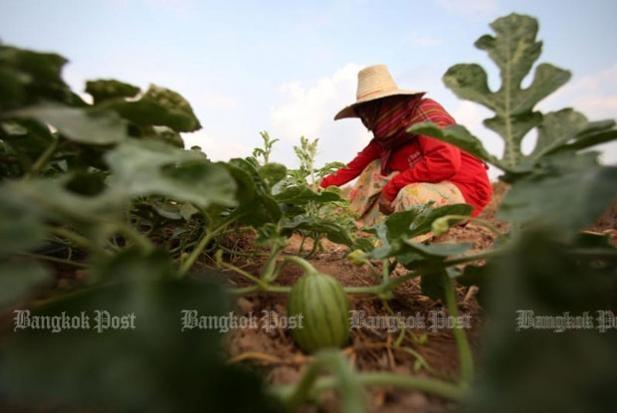
From now on, the all-time favourite dish, phad kapraokai (stir-fried chicken with holy basil) will never be the same, thanks to new findings by food safety advocates.
The release of the findings Wednesday by Thai-PAN or the Thailand Pesticide Action Network which randomly collected and sent to labs samples of veggies from our markets -- many are ingredients for our popular dishes such as Chinese lettuce, kale, string beans -- showed most contain farm chemical residues higher than acceptable standards. The tests for multi-residue pesticide screens (MRPS) were conducted by UK-based laboratories.
Similar results were also found in fruits, especially mandarin and guava. It was found that 100% of the two collected items of the two popular fruits are too dangerous to eat. The activists collected samples from various places -- wholesale markets and high-end supermarkets in Bangkok, the suburbs and in big cities.
The results are barely different in those markets, they said. Some 46.38% of samples from all sources were contaminated with farm chemicals.
Some may argue this is not the first time that we've found such results regarding farm chemicals, so why the alarm?
But this time, it's a real shock indeed.
To start with, it is because some of the veggies that are supposed to be safe, like organic (under the brand Organic Thailand) and chemically-safe types, are not totally free of chemical residues. One-quarter of organic veggies that cost consumers a lot more than conventionally-grown types were found to be tainted with higher-than-acceptable levels of chemical residues.
Veggies that are sold under the Q label, issued by the Agriculture Department, for chemically-safe produce, can also be unsafe.
More importantly, it showed that some farm chemicals that are legally banned, including carbofuran and methomyl, are still available. Residues of the two "dirty" chemicals can be detected in cucumbers and mandarins, for example.
Some chemicals that are supposed to be under tight control like DEET can be used widely. Cocktails of farm chemicals, mixtures of pesticides which make them more dangerous, are still the problem.
So, lack of enforcement on the part of the state agencies regarding chemical control appears to be the case. Not to mention, we know how farm chemical giants are lobbying hard to secure a place in the market for their dangerous substances that have been banned in advanced countries.
With frustration, some consumers shared the findings on social media. Many lamented that organic or Q labels seem to be a tool for agro-businesses to get higher prices for their produce which are no better than conventionally grown types. This is clearly unfair for consumers willing to pay more for their health.
For chillies, a major ingredient in most of our dishes, all of the sample or 100% were contaminated. After that was kaprao basil, another ingredient for Thai-style fast food items, with 66.67% of samples contaminated. This mean we have to eat the phad kaprao dish with caution. And it's quite similar for string beans (66.67%) and kale (55.56%).
A real surprise is cabbage, a vegetable known typically for heavy use of farm chemicals -- as shown by previous tests -- which turned out to be safe this time with all the samples free from pesticide residues. What could that possibly mean?
I believe the cabbage phenomenon must have something to do with consumers' purchasing power.
Many people, including me, stopped buying conventionally-grown cabbage in the market for this very reason. Is it possible that this kind of consumer awareness has shaped the growers' behaviour so that some of them turned to chemically-safe practices?
There's no question that all of us want safe food. Unfortunately, we have few, if any options. The situation is particularly bad for people who cannot cook at home themselves like office workers and instead depend on ready-cooked meals with our well-being up to the mercy of food vendors.
In all, the entire saga indicates that the state's efforts to promote food safety are just lip service. Apart from chemically-tainted veggies, we have issues with some dangerous substances such as colouring and formaldehyde among others that should not be found in the foods we eat.
This is ironic. We have for a long time taken pride in our food which is popular worldwide. We want other countries to recognise us as the "Kitchen of the World."
The question is: How Thailand can be the kitchen of the world if food safety remains an issue?


